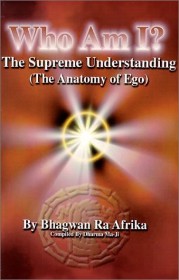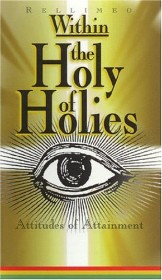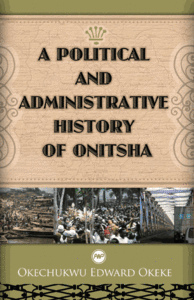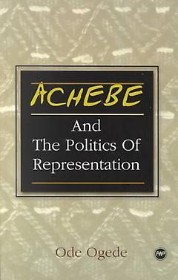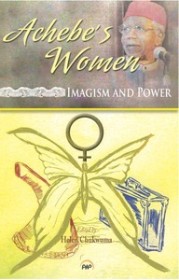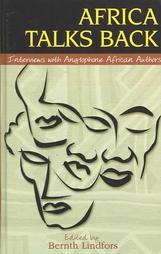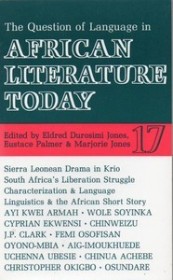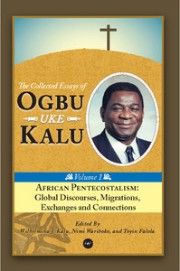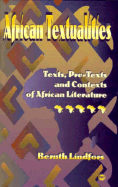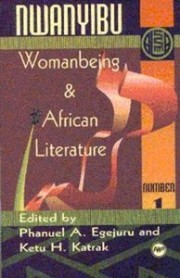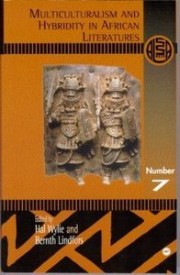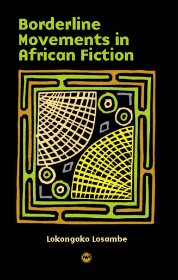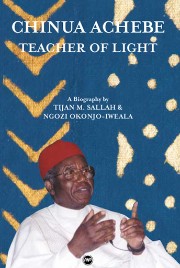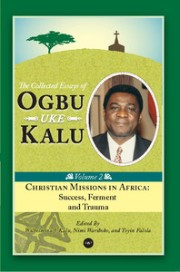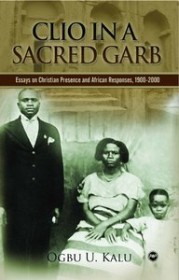Search results: 217 results found.
WHO AM I?: The Supreme Understanding
Africa World Press
Purchase - USD13.56
ISBN N/A
English
Year Published 2019
| Bookmark
Finding the path to spiritual happiness…
WITHIN THE HOLIES OF HOLIES: Attitudes of Attainment
Africa World Press
Purchase - USD29.95
ISBN N/A
English
Year Published 2019
| Bookmark
Located on the eastern bank of the lower Niger, Onitsha is one of the leading commercial cities and road transport hubs in Nigeria. Its main market is reputed to be the biggest in West Africa. Founded well before the twentieth century by an Igbo community, it is also predominantly Igbo in population. For a greater part of the twentieth century, up to the late 1950s, it was the leading educational center in southeastern Nigeria. During this period, it spawned a large volume of fictional tracts written by junior clerks and barely literate traders, the body of which is called “Onitsha Market Literature.”
A Political and Administrative History of Onitsha is an in-depth study of the political and administrative history of Onitsha from 1917 (the year it officially became an urban area) to 1970 (the year the Nigerian civil war ended). The book engages the literature on Onitsha and, generally,
ACHEBE AND THE POLITICS OF REPRESENTATION: Form Against Itself, From Colonial Conquest and Occupation to Post-Independence Disillusionment,
Africa World Press
Purchase - USD79.95
ISBN N/A
English
Year Published 2019
| Bookmark
Cultural nationalism has traditionally been taken as being as plain as day in Achebe's earliest fictional narratives upon which the attention of readers has obsessively been focused. But Ode Ogede calls this powerful view into question. Ogede introduces readers first to the irony of the fact that in these early works Achebe depended upon satires and tragedy- conventions of narrative borrowed from Europe- for his quest to reverse Western assumptions about Africans. He then re-appraises the connection between aesthetics and ideology in Things Fall Apart, Achebe's most famous first novel, which he examines alongside Achebe's lesser known early works of fiction, concluding that we may no longer continue to take commitment for granted in Achebe's early fiction. While arguing that it is ironic that the shortcomings of these imitative texts lies in their defining sources of energy, particularly their reliance upon the poetics of Aristotelian tragedy, tracing the evolution of th
Purchase - USD34.95
ISBN N/A
English
Year Published 2019
| Bookmark
Women character portraiture in Achebe’s novels has been seen from the widely explicit inferiority that marks her being. She is schooled from infancy to be docile and be satisfied with being voice-less even in matters that affect her or her children directly. The overall picture of women is one of weakness and self-effacement. This image stuck especially from the background of Achebe’s objective to present real heroes in the culture that is not what Josef Konrad depicted in Heart of Darkness. The story of Things Fall Apart is of Okonkwo and a society of men where women were relegated to the background of domesticity and motherhood and where if they offered any opposition however feeble, they were beaten to submission and silence. True but that did not reflect the whole story.
There are indeed some historical and cultural imperatives in Achebe’s representation of women in his fiction. These are varied according to the historical setting of his novels. Th
AFRICA TALKS BACK: Interviews with Anglophone African Authors, Edited
Africa World Press
Purchase - USD89.95
ISBN N/A
English
Year Published 2019
| Bookmark
The twenty-eight interviews collected in this edited volume were conducted between 1969 and 1986 in various parts of Africa, Europe and the United States. In the volume, leading writers from Nigeria, Ghana, Kenya, Uganda, Sudan, Malawi and South Africa speak out candidly about significant literary developments in the African continent.
Among the interviewees in the volume are Chinua Achebe, Kofi Awoonor, Dennis Brutus, John Pepper Clark-Bekederemo, Joe de Graft, Michael J. C. Echeruo, Obi Egbuna, Cyprian Ekwensi, Aubrey Kalitera, Ken Lipenga, David G. Maillus, Es’kia Mphalele, John Munonye, Meja Mwangi, Peter Nazareth, Anthony Nazombe, Njabulo Ndebele, Hilary Ng’weno, Grace Ogot, Gabriel Okara, Okt p’Bitek, Kole Omotoso, Richard Rive, Ola Rotimi, David Rubadiri, Taban lo Liyong, and Kalu Uka
AFRICAN LITERATURE TODAY, Vol. 17, The Question of Language in African Literature
Africa World Press
Purchase - USD21.95
ISBN N/A
English
Year Published 2019
| Bookmark
$21.95
SKU:
9780852555170
Quantity:
1
1
2
3
4
5
6
7
8
9
10
11
12
13
14
15
16
17
18
19
20
21
22
23
24
25
26
27
28
29
30
SAVE
SHARE
Product Description
Most African writers are at least bilingual, speaking an African language and writing in an acquired one.How adequately do poets, novelists, playwrights and short story writers use their adopted languages of English and French?To what extent do their African language backgrounds influence or even enrich their achievement in their adopted languages?Do they still use their indigenous languages to express contemporary reality?African Lite
AFRICAN PENTECOSTALISM: Global Discourses, Migrations, Exchanges and Connections, The Collected Essays of Ogbu Uke Kalu, Vol. 1,
Africa World Press
Purchase - USD39.95
ISBN N/A
English
Year Published 2019
| Bookmark
This book provides an excellent lens to view, interpret, and evaluate the Pentecostal experience in the African continent. Contrary to dominant Western perspectives on African Pentecostalism which sees it as a religious vehicle for Western global cultural influences in Africa, Kalu provides an alternative trans-national discourse that is sensitive to local identities, appropriations, and contestations of global processes.
In essay after essay in this volume, he demonstrates the courage to blaze a new path, offer new, bold insights, render prevailing discourse obsolete, and set sail a new one in the treacherous academic waters by shifting the terms, accent, and drift of the old one. As this set of sixteen essays shows, he researched profusely, argued trenchantly, and thought and taught powerfully to change how African Pentecostalism is portrayed, interpreted, and situated both within Christianity and within African traditional religions. In all this, he is not simply correcting distort
AFRICAN TEXTUALITIES: Texts, Pretexts and Contexts of African Literature
Africa World Press
Purchase - USD21.95
ISBN N/A
English
Year Published 2019
| Bookmark
African literary texts can be approached in a variety of ways. They may be examined in isolation as verbal artifacts that have a unique integrity. They may be studied in relation to other texts that preceded and followed them. Or they may be seen against the backdrop of the time, traditions and circumstances that helped to shape them. In this book, all these approaches have been utilized, sometimes singly, sometimes in combination.Included among those authors whose texts are discussed in detail are Peter Abrahams, Chinua Achebe, Ayi Kwei Armah, Mongo Beti, John Bruin, Mbongeni Ngema, Ngugi wa Thiong'o, Okot .'Bitek, Ken Saro-Wiwa, Leopold Sedar Senghor, Ansuyah R. Singh, and Amos Tutuola.
ALA ANNUALS, Vol. 1, Nwanyibu: Womanbeing & African Literature
Africa World Press
Purchase - USD18.95
ISBN N/A
English
Year Published 2019
| Bookmark
These essays explore the condition of African women, focusing on what one-contributor describes as "the discourses of colonialism and sexism (as) sites where gender, sexuality, race and power constructions intersect." The essays are divided into four categories:The first section under the title "Realities and Fantasies of African Womanbeing" includes essays such as Phanuel Egejuru's exploration of "The Paradox of Womanbeing and the Female Principle in Igbo Cosmology."Section two, "New Options and Redefinitions of Womanbeing," includes Janice Spleth's discussion of Mudimbe's Before the Birth of the Moon; Pauline Uwakwe's cross-cultural analysis of the similarities and differences among female characters in works by continental African writers and those in the diaspora in "Female Choices: The Militant Option in Buchi Emecheta's Destination Biafra, and Alice Walker's Meridian."Section three: "South African WomenWriters and Womanbeing" includes an essay by Natasha Vaube
ALA ANNUALS, Vol. 7, Multiculturalism and Hybridity in African Literatures
Africa World Press
Purchase - USD24.95
ISBN N/A
English
Year Published 2019
| Bookmark
This volume of essays covers all phases and geographical areas of African Literature, including lesser known areas such oral literature, literature written in African language and Lusophone writing. The more studied Francophone and Anglophone literatures are well presented, as are North Africa and the Caribbean. The newest developments in South African theater are described and commented. Two articles on African film are included.Several writers receive special attention: Chinua Achebe, Maryse Conde, Wole Soyinka, Calizthe Beyala, Nugugi wa Thiong'o, Niyi Osundare and Hampate Ba. This volume also contains the keynote addresses by Achebe, Conde, Ngugi and Osundare. In addition there a re articles introducing a number of younger and newer writers such as Bandele Thomas, Joel Matlou, Marie Chauvet, J. J. Dominique, Patrick Chamoiseau and Caryl Phillips.The 1998 conference held in Austin, Texas was the biggest conference ever held by the ALA, and this volume reflects the excitement at the
Purchase - USD24.95
ISBN N/A
English
Year Published 2019
| Bookmark
n Borderline Movements in African Fiction, Losambe uses African fiction to test the validity and relevance of critical assumptions made by postcolonial African metatheorists--nativists, assimilationists and syncretists-- as they try to define African subjectivity and derive an immanent African epistemological order from it.
Through a detailed analysis of the works of African novelists such as Chinua Achebe, Ayi Kwei Armah, Mongo Beti, Camara Laye, V.Y. Mudimbe, Mbulelo Mzamane, Ngugi wa Thiongo, and NJabulo Ndebele, Losambe asserts that, like the syncretists, these writers locate African subjectivity in the borderline space between Africas precolonial tradition and Western values, Africas orality and Western literacy.
A product of many years of research and scholarship, this book crosses many borders and traverses many cultures. Its landscapes are wide, its analyses frequently deep and engaging. A literate and worthy contribution to the theory and criticism of African litera
CHINUA ACHEBE: Teacher of Light
Kamagezi
Purchase - USD21.95
ISBN N/A
English
Year Published 2019
| Bookmark
Born in Ogidi, southeastern Nigeria, on November 16, 1940, Chinua Achebe has become one of the worlds leading fiction writers. He is a fascinating writer, whose life is of the stuff that makes fiction. Growing up in the cultural crossroads of colonial Nigeria, he lived and mediated in a world in which his people moved between allegiance to traditional Igbo beliefs and values and those introduced by the British colonialism, particularly Anglican Christianity under the Church Missionary Society.
Achebes father was a zealous Anglican missionary, who was nicknamed Nineteen-Four, referring to the start of his missionary journeys in Nigeria in 1904. On the other hand, Achebes uncle, Udo Osinyi, was a die-hard Igbo, who stuck to traditional religion. It is said that he once ordered missionaries singing choir songs in his yard to leave, stating Your singing is too sad to come from a mans house. My neighbors might think it was my funeral dirge." This tension-filled life at societal crossr
Purchase - USD39.95
ISBN N/A
English
Year Published 2019
| Bookmark
The narratives and analyses in this volume will enable scholars of global Christianity to discern how the shifting center of gravity in Christianity is being played out in Africa. Kalu in these essays do not simple record demographic shift, numerical growth, and vitality of African churches, but also and importantly shows how the expressions of Christianity are filtered through African cultures.
The narratives are intellectually compelling and emotionally engaging. They primarily focus on concrete lives and efforts of people engaged in the missionary endeavor. The essays do not simply tell the story of how African Christians are engaged in the practices of sharing their faith. They also describe how African Christians are shaping the world through the power of the Christian gospel and the ethic of love expressed in the life of Jesus Christ.
Kalu makes the significant point that it is unnecessary for missiologists studying the recent blooming of Christianity in Africa to search for it
Purchase - USD29.95
ISBN N/A
English
Year Published 2019
| Bookmark
This book consists of essays on African church history: historiography, context (ecology and worldviews), the missionary enterprise and African responses that explain the massive growth of Christianity in contemporary Africa. Some essays have been published; others are unpublished, or rewritten to fit into a theme. Clio is the ancient Muse of History. When dressed in a sacred garb, the muse performs for religious people and, in this case, for church historians. The essays address the cutting edge of contemporary African church historiography and the process of appropriation of the gospel in the encounter with Christianity. The essays contend that culture-contacts, as in the missionary movement, involve configurations of power. Thus, culture, conversion, and civilizing mission are power concepts that dominated the relationship between white missionaries and black Christians even after decolonization. The African context, shaped by diverse cultures, ecosystems, worldviews and poverty exp

